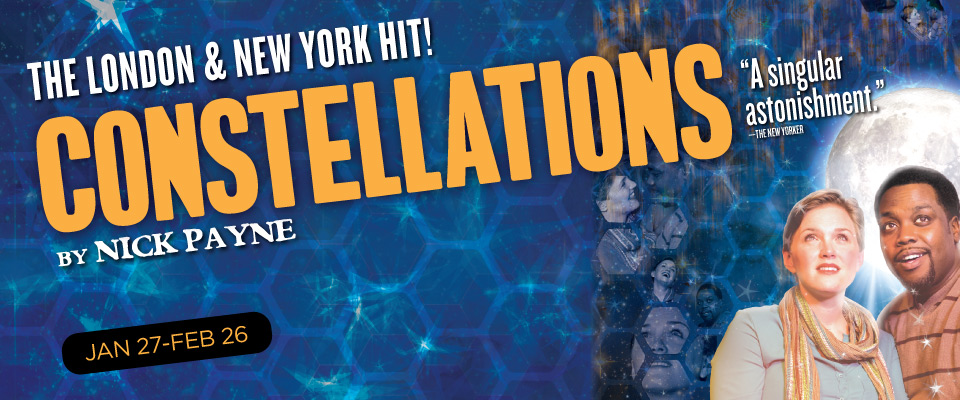AN INTERVIEW WITH CONSTELLATIONS PLAYWRIGHT NICK PAYNE
Constellations had its world premiere at London’s Royal Court Theatre in 2012. During the rehearsal period, Playwright Nick Payne gave some insights into his intriguing new creation.
Special thanks to the Royal Court Theatre for allowing us to reprint portions of this interview below.
What sparked the idea?
It was probably about bees and beekeeping. I watched a documentary called Vanishing of the Bees, and it was about how bees are dying out in the US and how they are farming bees too intensively, and that was the starting point.
I sort of worried about how you could do bees on stage. So I decided not to go down the bee play route, so by chance I watched a documentary called The Elegant Universe by Brian Green and it was amazing. It was a history of contemporary theoretical physics and right at the end he touched on this idea of the multiverse.
How did you bring the idea of multiverse and beekeeping together?
Well I guess I like that the multiverse stuff was so theoretical, so I spoke to a cosmologist. I asked her – when you’re at a party and you get asked what you do for living what do you say? And she said, “I study the origin and fate of the universe,” and I thought that was a pretty amazing way of describing your job.
I liked that beekeeping is a micro-endeavor, it’s very clear. You’re investing in a specific eco-system and how you go about maintaining that. So I met a beekeeper who is an artisan beekeeper, so he is very careful about the way he works and how he makes his honey. It’s a kind of job one man does on his own. He drives around London, visiting these hives looking after the bees. In one sense his job isn’t theoretical at all, but like the cosmologist, can be quite isolated.
Again I spoke to someone and they way they work is by analyzing data from one tiny bit of the galaxy, so I felt like in a way both their jobs (the beekeeper and cosmologist) have different roles but they essentially work alone and they have to compartmentalize their work to get it done. I guess overall I just didn’t want to let go of the bee stuff.
How did you find the form of the piece?
I guess I took the idea of a multiverse and that everything we do will exist in a massive ensemble of universes; it is theoretically simultaneous, so right now we’re having this conversation, you’re wearing a different jumper, I’m wearing different shoes and you’re using a pen and paper instead of an iPad. So it could be something tiny that is different, it’s like a branch of tree that comes into existence when another possibility is theoretically possible.
I thought it would be an amazing form for a play, so I wrote loads of material and edited it down. So I wrote maybe a third more than what was actually in the play and then cut it out.
There were a few more possibilities, there was another chunk in their life, and in one version Marianne was pregnant, in another she couldn’t get pregnant and another she was going to adopt but it felt like one step too many somehow in the play, so it got cut out.
There were one or two more universes. I wanted the story to be incredibly simple. I hoped, if the form was difficult to get on board with, that the story wouldn’t be at all. The rule I set was that it must be the first and last of everything, something I stole from Closer. It’s the first time they meet, their first date, their first break up, they get married, and then she’s very ill. So the idea was including the key bits of their life.
Once you found the form, did you write it quickly?
I actually wrote most of it in Georgia, when I was working with the International Department at The Royal Court. I was really jet-lagged and I couldn’t sleep, so I would work from 2:00 till 4:00 in the morning.
The first bit in the play is really stupid when Marianne talks about licking her elbow, but when I wrote it I was a bit woozy and at the time I thought it was really funny. From then, I wrote the first draft in two weeks, and then after that, it took a period of months.
What would you like the audience to take away from your exploration of Marianne and Roland’s different worlds?
With Constellations I found the theory really interesting. This was because in some ways I found it quite moving knowing that someone who had died could be living in a different universe. It felt romantic, yet unnerving, because I’ll never know. … I was interested in examining the scope of Marianne and Roland’s personalities, because anatomically they are composed of the same elements, yet slightly rearranged in another universe, I didn’t want them to be completely different as I could release the audience from any sense of empathizing with the causality of what they’re doing.


